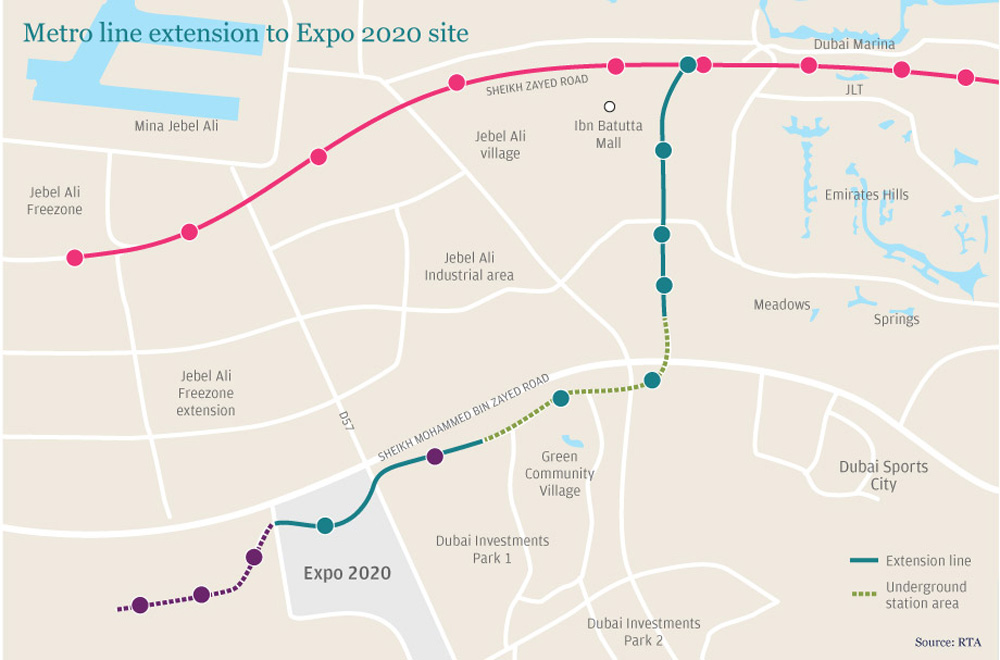Ahead of Middle East Rail, Alstom group, the provider of the Dubai Tram and the leader of the ExpoLink consortium for Route 2020 project of the Red Line extension of Dubai Metro, highlighted eight new technologies with the power to transform mobility in the Middle East now or in the very near future.
Alstoms business in the UAE increased to $2.4bn, after it won the contract to extend the Route 2020 Dubai Metro’s Red Line to the Expo 2020 venue in Dubai. The RTA awarded the $2.8bn main contract to the Alstom-led consortium Expolink, which also includes Spains Acciona and Turkeys Gulermak, to design and build an extension for the Red Line and upgrade the system of the existing line in June 2016.
Route 2020 works are undergoing with 15km length, Alstom GCC’s managing director Thi Mai Tran said, adding that it is expected to be operational by spring 2020, five months ahead of the Universal Exposition being hosted by Dubai.
Ranging from connected tech to help passengers plan easier, more comfortable journeys, to autonomous last-mile shuttles, next-generation electric buses, and behind-the-scenes management systems to keep the whole transport system running smoothly, each of the innovations by Alstom is available now to be deployed.
When put together, they offer a revolution in smarter, more sustainable mobility for both passengers and operators, and will help rapidly growing cities move and breathe more easily for a better tomorrow.
Highlights:
- Optimet OrbanMap, an intelligent metro map: Designed for a collective use, and located in the station, Optimet OrbanMap allows visualising at a glance the metro network, its activity, trains position, travel times, service interruptions, and the level of comfort aboard the trains.
- Optimet real-time train occupancy: To address the issue of passenger congestion due to lack of knowing which carriages are empty, Alstom launches Optimet real-time train occupancy, a solution that shows the level of occupancy per car through a colour LED strip (red, orange or green) above the screen doors which stretches all along the platform, as well as on monitors in the station passage ways and/or elevators.
- EZ10: Alstom’s 14mn startup company EasyMile has manufactured an electric autonomous shuttle called EZ10; defined as an electric collective shuttle that can accommodate up to 12 passengers, the vehicle is designed to be integrated in an automated road transport systems (ARTS), dedicated to the public transportation application, in private areas or cities.
- Aptis: The 100% electric Aptis is essentially a tram on wheels, carrying up to 95 passengers. It features panaromic windows, low-noise levels, smooth access for wheelchairs and strollers, and the option to ‘dock’ at footpaths, allowing passenger comfort.
- Nomad Digital Solutions: Nomad offers Wi-Fi connection solutions as well as entertainment platforms (video, music, and playback) or connected on-board services. It also provides tele-maintenance solutions, including Remote Online Condition Monitoring, Reliability Centred Maintenance, Driver Assist and Power Train products.
- Mastria: The multimodal supervision solution, which, through planned predictive and automated data analysis is able to generate quick and reliable reports, allowing operators to rapidly offer alternative mobility solutions to commuters, especially useful in case of train delays due to traffic and breakdowns.
- HealthHub: This is solution that collects data from rolling stock, infrastructure and signalling systems and allows predictive maintenance across all assets.
- Autonomous systems: Alstom has equipped more than 50 lines with Automatic Train Operation (ATO) in cities like Singapore, Hong Kong, Shanghai (China), Lausanne (Switzerland), or Panama, and is equipping 40 others making the group a leader. Alstom is also investing in equipping mainline trains with driving assistance. Driverless rolling stock ensures flexible operation and reduces cost related to operations.

